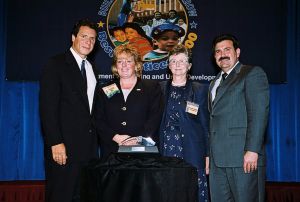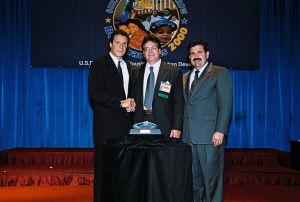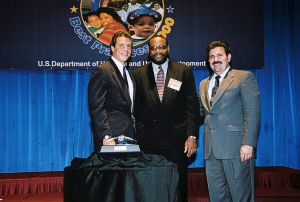 |
2000 Best Practice Awards
Best of the Best Winners: Pennsylvania
Best Practice: Reading Buddies
THE WISDOM EXCHANGE: SENIORS AND STUDENTS
SHARE LIVING HISTORY
Philadelphia, Pennsylvania. More than 100 inner-city students, elderly residents
and young residents with disabilities have forged intergenerational connections,
exchanged oral histories, and widened academic and career horizons
through participation in the “Reading Buddies” program, a volunteer
mentoring initiative active in four Section 8/Section 202 facilities in
the heart of Philadelphia and a southwestern section of the city.
The program grew from a small intergenerational
activity at a local Presbyterian Church. When one of the |

Jane Lahage and Patricia Quaig receiving Best
of the Best award from Secretary Cuomo (l) and Deputy Secretary Ramirez
(r) |
church members moved into a Section 202 facility,
the Riverside Presbyterian Towers, she met with the facility owner, management
agent, and residents and staff of PresbyHomes & Services to explore
interest in duplicating the program on-site. Forming a small working group,
they reached out to school district personnel, who soon signed on as partners.
With additional support from three local Presbyterian congregations that
donate games, books and other supplies, Reading Buddies was launched in
1982 with 15 volunteers.
“The Reading Buddies program is elegant
in its natural simplicity, loving in its execution and vital to the welfare
of children at risk,” says the Rev. Fergus A. Smith, former pastor
of The First Presbyterian Church in Philadelphia that supports the
program.
Using a total budget of $300 for refreshments,
Reading Buddies relies on donations of time and materials from area organizations
and more than 100 resident volunteers. An unpaid director oversees the program,
identifies additional partners and helps establish new sites. The social
services coordinator at participating PresbyHomes sites works with teachers
at the nearest elementary school to identify resident volunteers and 2
nd –6 th grade students to participate as “buddies” for the
academic year.
The senior-student buddies meet once a week during the school day in a housing
facility’s community room for an hour-long session. The school provides
transportation for the children to the housing facilities. These informal
weekly sessions are shaped by shared interests of the residents and the
children, and include reading, tutoring, playing games, sharing hobbies
and, most importantly, mentoring.
Each senior-student pair participates in a
planned activity such as learning about important African-Americans during
Black History Month. Other times, the pairs might just play Scrabble, which
helps with spelling and vocabulary. At one site, the children wrote an oral
history about the lives and experiences of their elderly buddies. Once a
quarter, students hear presentations from guests, such as an animal shelter
director, dental hygienist, musician, newspaper reporter, art museum educator
and television cameraman. The talks help expand the students’ awareness
of career options.
Reading Buddies reduces senior resident isolation
and improves their quality of life. Perhaps more impor-tantly, seniors on
limited incomes are able to give back to the community through their time
and commitment to the children. Teachers with students participating in
the program note their children’s improved grades, maturity, personal
appearance and attendance. The program also meets dual goals of the school
district of Philadelphia—increased volunteerism and the formation of
community partnerships that contribute to children’s education.
Students learn “hands-on” history.
During one Black History Month, a resident volunteer relived the civil rights
march coordinated by Martin Luther King in Washington, DC, in the 1960s.
The children expressed wonder that they could touch someone who had actually
seen Martin Luther King.
An operations manual will soon be available from PresbyHomes & Services
providing detailed instructions for replication.
Contact: Jane Lahage. Phone: (610) 260-1122
Tracking number: 152
Winning Category: Program (Housing - Multifamily) |
Best Practice: Saint James Manor
Saint James Manor Houses and Provides Self-sufficiency
Services for Homeless Victims
Pennsylvania.
Saint James Manor is a transitional housing facility for homeless individuals
and families with special needs that is able to provide treatment for up
to 24 months. The completion of Saint James Manor’s 16 units, in a
building that had previously been condemned, more than doubled the available
units for the homeless with special needs in Lackawanna County.
The program at Saint James Manor features
structured levels or tiers of assistance that help residents, including
homeless veterans, chronic mentally ill individuals and homeless individuals
who completed substance abuse treatment programs, to transition between |

Stephen Nocilla (c) receiving Best of the
Best award from Secretary Cuomo (l) and Deputy Secretary Ramirez (r) |
program levels while remaining in one facility.
The program ultimately eases participants toward self-sufficiency in permanent
housing, providing intensive case management services using a primary care
approach. Among the services available at the facility are life skills training,
vocational training, employment assistance, mental health counseling, and
substance abuse treatment.
During the first year of operation, Saint
James Manor housed 27 individuals. Sixty-two percent of the participants
remained in the program through the first year, 81 percent maintained employment,
85 percent contributed to rental and utility payments, and 79 percent received
medical services such as treatment for drug and alcohol addiction, mental
health services, or treatment for HIV/AIDS.
The need for additional housing for the homeless
in Lackawanna County, Pennsylvania was great since existing programs could
only provide temporary housing and services. A long-vacant building in Scranton
was conveniently located near many facilities involved in transitional housing,
such as a day shelter, a soup kitchen and emergency shelter.
A partnership of several county and state agencies and nonprofit organizations
contributed resources to undertake the renovation of the vacant building
and turn it into 16 units of housing. Resources included tax exempt financing
from the local Redevelopment Authority and through a large banking institution,
financial assistance from local government agencies, and financial and furniture
donations from organizations such as local veteran and senior citizens groups
and faith-based organizations. By involving so many community groups in
the renovation process, Saint James Manor raised community awareness of
the needs of the local homeless population.
Contact: Stephen Nocilla, Phone: (570) 207-2283
Tracking Number: 218
Winning Category: Program (Community Planning and Development) |
Best Practice: Universal Companies
Myriad of Non-Profit Organizations Revitalize
South Central Philadelphia
| Philadelphia, Pennsylvania. Universal Companies is a community development corporation
in South Central Philadelphia that takes a holistic approach to community
revitalization, addressing the need for improved housing, education, and
economic development. By building the organizational and economic capacity
needed to challenge many of the underlying causes, as well as the effects,
of poverty, Universal Companies promotes opportunities for positive community
change through real estate development, workforce development and education.
Its efforts to improve the physical landscape of the community are anchored
|

Abdur-Rahim Islam (c) receiving Best of the
Best award from Secretary Cuomo (l) and Deputy Secretary Ramirez (r) |
by a commitment to rebuild the hope,
confidence and spirit of the people who live there.
Universal Companies is a group of nonprofit
organizations that have emerged from Universal Community Homes, started
in 1993 as a developer of affordable housing. Universal Companies has expanded
to provide quality affordable housing, education for children and adults,
employment opportunities, and economic development, with projects that include
new and rehabilitated townhouses, a charter school, a new small business
support center and a six-story workforce development center.
Since its inception, Universal Companies has
developed 120 units of rental and homeownership housing, more than 75,000
square feet of commercial space, and operates four programs at a cost of
more than $22 million.
The consortium of Universal Companies is formed
by Universal Community Homes and includes entities such as a construction
company, a business support center, a center for employment training, retail
operations, a charter school, and a resource center. This consortium also
works in partnership with external companies and organizations that operate
as one of two teams: either development or finance. The teams include companies
that focus on development and property management, construction, law, architecture,
and financial institutions. The Universal Companies also work in partnership
with city, state, and federal agencies.
The areas targeted by Universal Companies
are located near other areas of Philadelphia that are undergoing redevelopment,
such as downtown and the Avenue of the Arts, but the living conditions for
residents in the target area are marked by low median incomes and high unemployment.
In addition, more than 4,000 vacant houses and more than 1,000 vacant lots
exist in the target area.
Universal Companies is involved in more than
$300 million in real estate development projects that will result in developing
additional housing, a community center, a performing arts training center,
a workforce development center, commercial and retail space, and a charter
school.
Contact: Abdur-Rahim Islam, Phone: (215) 732-6518
Tracking number: 2960
Winning Category: Geographic and Program (Community Builder) |
Return to Best
Practices 2000 Best of the Best Winners
Content Archived: April 20, 2011 |